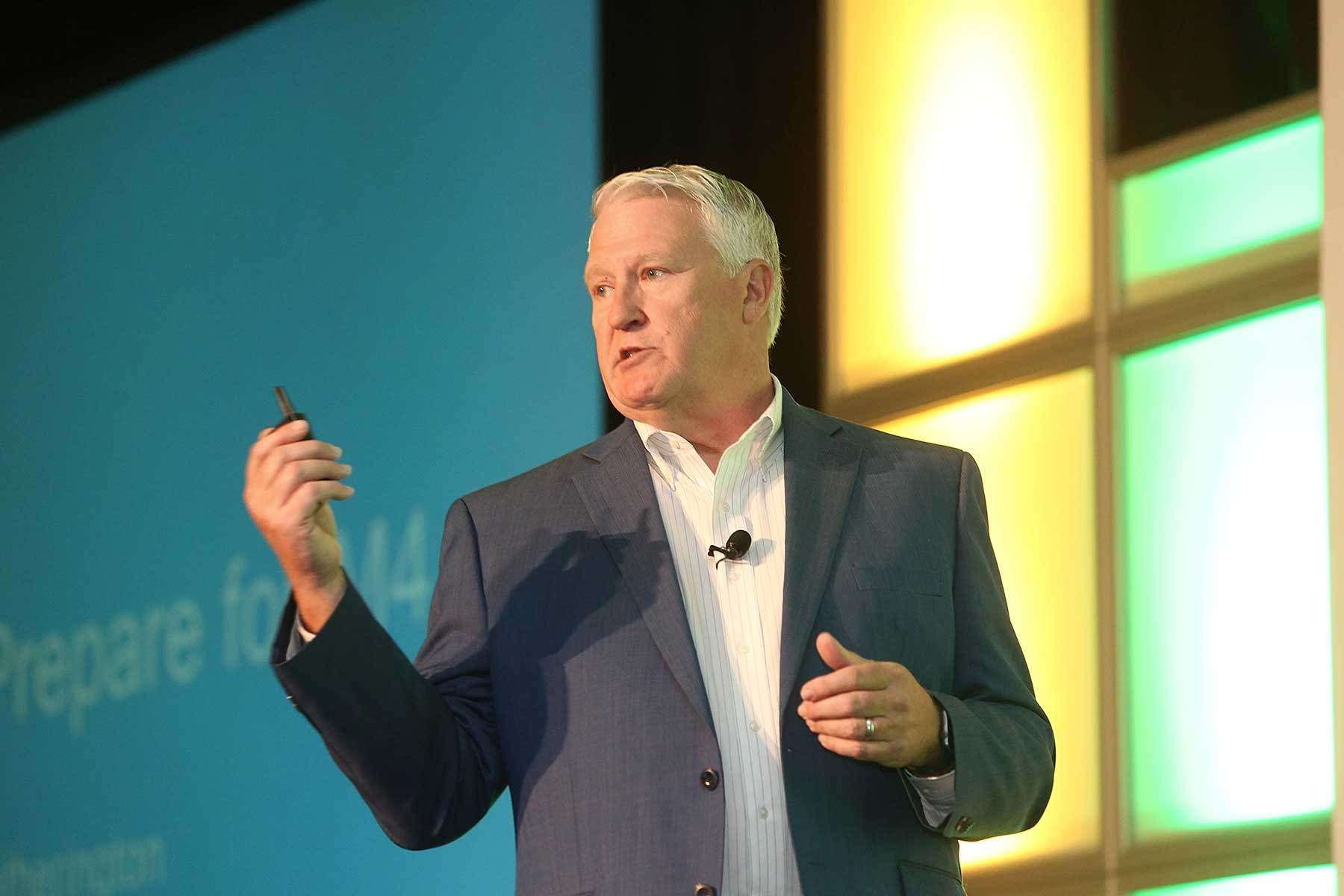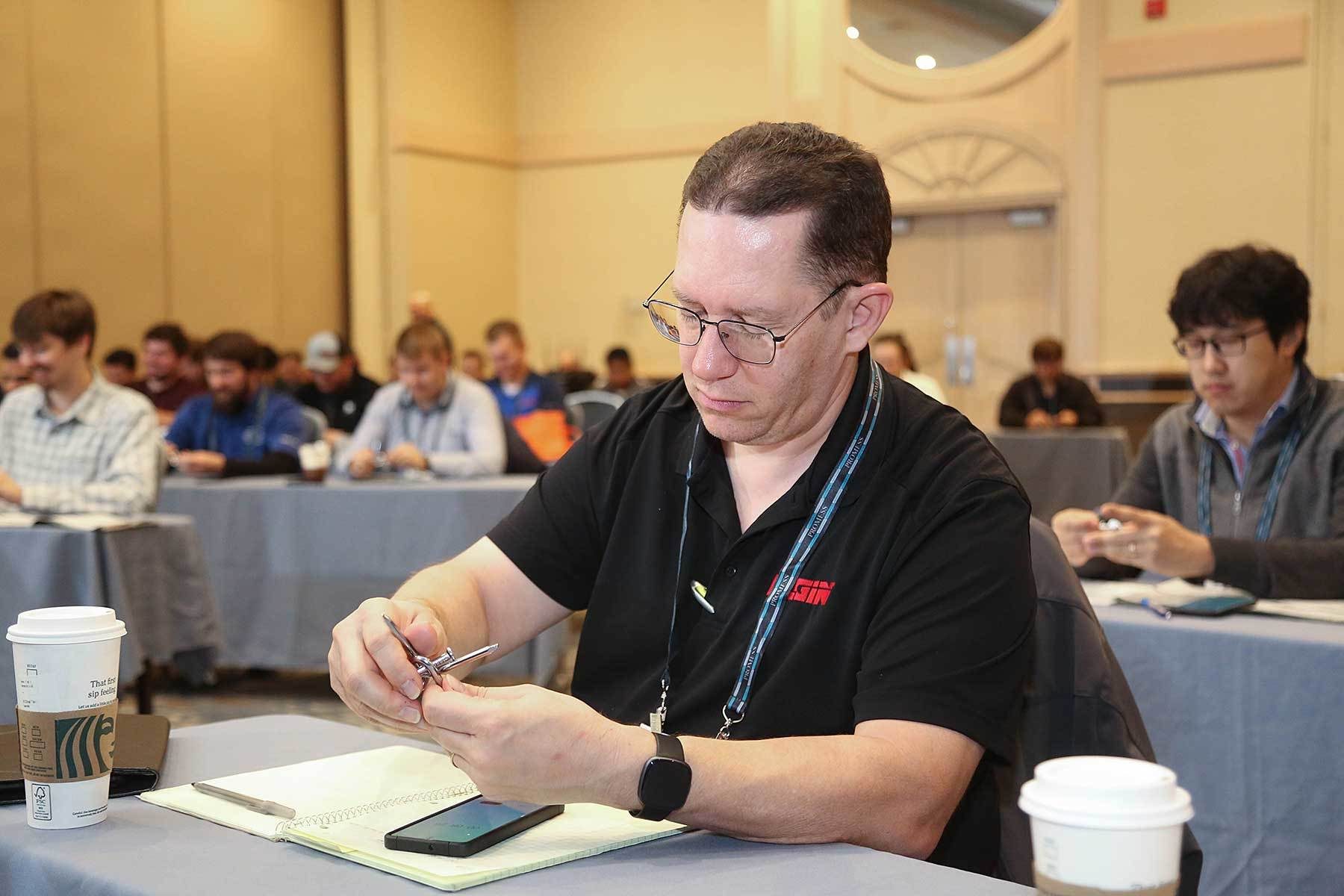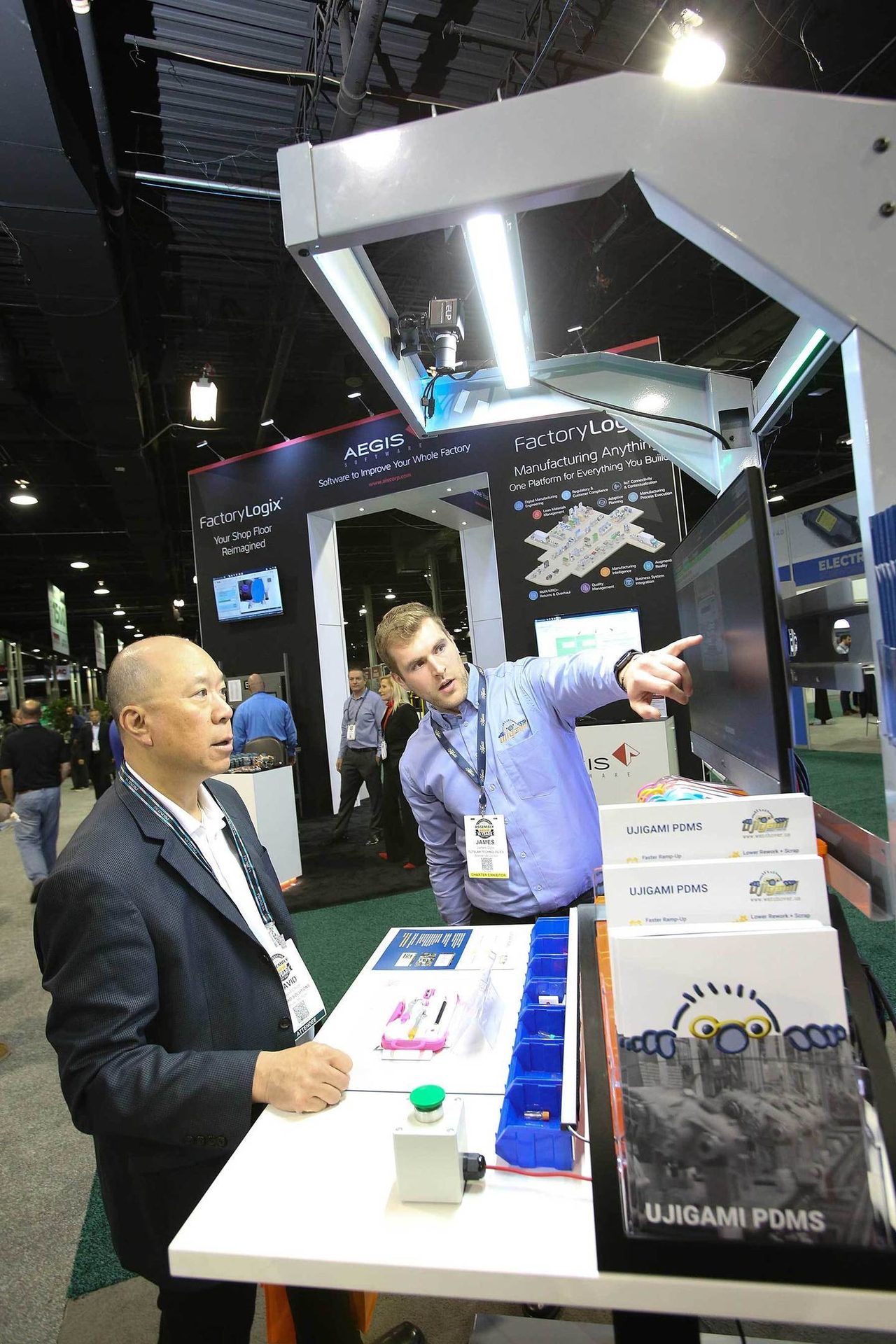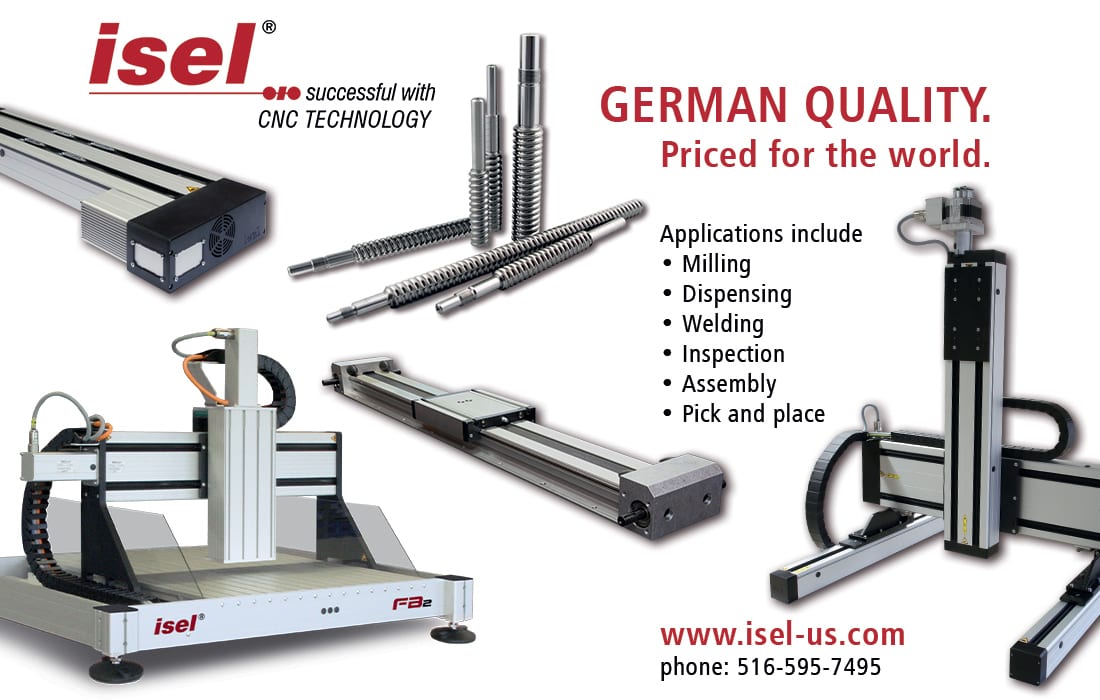The ASSEMBLY Show
John Sprovieri // Chief Editor
Thousands of engineers turn out to see the latest assembly technology.
What’s New From the ASSEMBLY Show
Nearly 3,900 manufacturing professionals saw the latest robots, fastening tools, software and automation at the 10th annual ASSEMBLY Show. Photo by Brad Meese
Nearly 3,900 manufacturing professionals saw the latest robots, fastening tools, software and automation at the 10th annual ASSEMBLY Show, which was held Oct. 25-27 at the Donald E. Stephens Convention Center in Rosemont, IL.
The show featured 234 exhibitors spread across more than 62,000 square feet of floor space. Some 71 percent of the 2022 exhibitors renewed their booth space on-site for the 2023 show.
“Assembly technology is changing at an incredible pace, and we are thrilled that for the last decade we have been able to create a vibrant event for our attendees, exhibitors, sponsors and speakers to come together to provide valuable information on the latest industry trends and fresh insights on how to improve processes and the bottom line,” says Bill DeYoe, publisher of ASSEMBLY magazine, which produces the event. “Our attendance was up 25 percent since our last event, and we heard positive feedback on the quality of the attendees who took advantage of our expanded show floor and education program.”
More than 5,600 industry professionals from across the United States and around the world registered to attend the show. Attendees came from every industry covered by ASSEMBLY magazine, including such companies as Abbott Laboratories, Borg Warner, CNH Industrial, Ford Motor Co., Kohler, La-Z-Boy, L3 Harris, Motorola, Northrop Grumman, Terumo Cardiovascular Systems and Yamaha.
The event kicked off with a full day of educational sessions that attracted hundreds of attendees. Conference tracks covered metal welding for battery packs; lean manufacturing; plastics joining; electric and autonomous vehicle assembly; and how to develop the next-generation manufacturing workforce.
Editors from ASSEMBLY Magazine led dozens of attendees on guided exhibit hall tours. The tours gave attendees a sampling of exhibitors in six technology categories: robotics, fastening tools, autonomous and electric mobility, Industry 4.0, pressing and riveting, and automated assembly systems.
Subject matter experts from 14 exhibitors gave presentations at the show’s Learning Theaters in the exhibit hall. The sessions, which averaged 40 attendees, covered topics such as artificial intelligence, augmented reality, automated assembly systems, automated guided vehicles, fastening, laser welding, leak testing, robotic assembly and vision systems.
During the opening night “Taste of Rosemont” reception, high school students from PWNAGE Robotics team 2451 demonstrated the various robots they built, all of which use technology that is applicable for assembly. The team is based in St. Charles, IL, sponsored primarily by exhibitor Genesis Automation and competes in FIRST (For Inspiration and Recognition of Science and Technology) Robotics competitions internationally to gain real-world engineering experience.
Keynote Discusses Lean and Industry 4.0
The show’s keynote address was presented by Charles Wetherington, president and COO of BTE Technologies, a midsized manufacture of physical therapy equipment in Hanover, MD. Photo by Brad Meese

The show’s keynote address was presented by Charles Wetherington, president and COO of BTE Technologies, a midsized manufacture of physical therapy equipment in Hanover, MD. Lean manufacturing and Industry 4.0 should be viewed as toolboxes, argued Wetherington. Deciding which tools to apply and when is the art—and science—that will help small and medium ventures thrive in the decade to come.
“You don’t reach for a hammer if you’re trying to drive a screw,” he told an audience of more than 200. “First, you have to assess where your business is, and then you choose the right tools to implement. Believe it or not, analysis of our business data has brought us to something that you wouldn’t think of as being lean, and that’s batch manufacturing.
“After looking at the type of manufacturing we do and the volumes we run, we concluded that we could gain economies of scale by making four, five or six systems at a time, and that far outweighed the costs associated with keeping that equipment in inventory. The labor content in our products is relatively low. Even when you include all our overhead costs, it still doesn’t have a big impact. We gain much more efficiency by batch manufacturing components for our products. We’re seeing great improvement in labor utilization.”
Although BTE does not employ a large amount of automated assembly technology, the company is deploying technology to help assemblers with manual tasks.
“We have dramatically improved both the availability and the richness of data that is available to production personnel on the shop floor,” Wetherington says. “We have flat screens on rolling stands that are connected wirelessly to our ERP system. Workers can readily access information on assembly processes and access assembly prints. That’s important, because we have products that we might make once every three weeks or once every four months. With the touch screens, they know exactly what they’re supposed to do. You don’t want people relying on memory. You want to give them the best tools possible.”
The ASSEMBLY Show kicked off with a full day of educational sessions. Conference tracks covered metal welding for battery packs; lean manufacturing; plastics joining; electric and autonomous vehicle assembly; and how to develop the next-generation manufacturing workforce. Photo by Brad Meese

Prior to the keynote, ASSEMBLY presented Brose Tuscaloosa Inc. with the 2022 Assembly Plant of the Year award. The company received an engraved crystal award and a commemorative banner.
Brose Group’s state-of-the-art assembly plant in Vance, AL, mass-produces door modules and seat structures for a wide variety of vehicles, including the Ford F-150 pickup truck and the Mercedes-Benz EQS SUV.
Brose Tuscaloosa operates 12 assembly lines, including eight on the seat side of the factory and four on the door side. Although more than 40 robots are in use in various parts of the facility, most production lines are semiautomatic, with operators interacting with presses, DC electric fastening tools and end-of-line functional test stands. They also rely on riveting equipment and laser welders.
The award ceremony in Rosemont was attended by Jim Barbaretta, Brose Tuscaloosa plant manager, and Niclas Pfueller, chief operating officer of Brose North America Inc. in, Auburn Hills, MI. Six operators also took time out to attend the event.
“It’s great to be recognized both for our innovation, and more importantly, for our culture,” says Barbaretta. “That’s one of the driving factors behind innovation and technology implementation.”
Product of the Year Winners
In the factory of the future, software will be every bit as important to product assembly as robots, riveters and nutrunners. The exhibitor list at The ASSEMBLY Show reflects that sea change, with nearly two dozen software vendors. Photo by Brad Meese

To draw attention to the breadth and quality of new technologies on display at The ASSEMBLY Show, we again held a “Product of the Year” contest during the event.
Twenty innovative products were nominated in five categories. Attendees voted for their favorites via tablet computers at a special display on the show floor. Voting was open during the first two days of the show, and the winners were announced the morning of Thursday, Oct. 27.
In the “Assembly Machines and Systems” category, the winning product was the Digitool, a standardized, modular automated assembly cell that learns and executes manufacturing tasks based on a product CAD file without custom software or fixtures. The Digitool can perform an array of assembly tasks, including pick and place, screwdriving, dispensing, laser engraving, labeling and testing. It can even perform disassembly. To understand a product, the Digitool is connected to the Launchpad enterprise software stack. Through simulation, it learns what it needs to do and transfers this knowledge to the real world using high-precision cameras and artificial intelligence. The Digitool simply needs to be provided with a product CAD file, and it will automatically configure itself and build the product. Digitool connects to cloud-based software and responds to process changes.
The show featured 234 exhibitors spread across more than 62,000 square feet of floor space. Photo by Brad Meese
In the “Adhesives, Dispensing and Curing” category, the winning product was DELO’s Activis 600 system for applying UV-cure adhesives. The system combines dispensing and pre-activation in a single step. The process is ideal for bonding and encapsulating temperature-sensitive electronic components. Because the adhesive is already irradiated during dispensing, the curing reaction starts even before the adhesive meets the component. Exposed adhesive areas can be additionally irradiated and fixed after joining. The combined process provides immediate initial strength, preventing the adhesive from flowing out and the components from slipping. The adhesive cures reliably to final strength whether or not there is additional light fixation. No additional process steps are needed, even in undercuts and shadowed areas.
Panasonic’s AccuPulse 4.0 cordless mechanical pulse tool won the “Fastening Tools” category. The tool is equipped with four onboard microcomputers and a built-in torque transducer for better quality control, accuracy and data collection on the assembly line. The tools cover a torque range of 12 to 120 newton-meters. The tools can be operated one-handed with no torque reaction. The tools provide two-way wireless communication for advanced error proofing and data collection. Annual maintenance costs are 90 less than competing hydraulic pulse tools. Up to 99 parameters can be programmed through the controller.
The ASSEMBLY Show hosted numerous robot OEMs, including Epson, Fanuc and Univeral, as well as multiple suppliers of grippers and other robotic peripherals, such as Schunk, ATI Industrial Automation and Zimmer. Photo by Brad Meese
FANUC’s CR-35iB cobot was voted the most popular product in the “Robotics” category. The cobot can carry a maximum payload of 35 kilograms. It has a large work envelope and a small installation footprint, making it ideal for tight spaces. It has a maximum reach of 1,831 millimeters, a maximum speed of 750 millimeters per second, and a positional repeatability of ±0.03 millimeter. The cobot is 62 percent lighter than the previous model, making it suitable for mounting to a seventh axis or to an autonomous mobile base. The cobot does not require a levelling plate to counter any unevenness of the floor, making installation easier. The cobot is equipped with contact stop protection and FANUC’s Dual Check Safety technology, a safety system that monitors position and speed. The robot can be programmed through hand-guiding or an HMI. The robot can be equipped for vision guidance and force feedback.
The show featured state-of-the-art automation systems, like the Symphoni from ATS Automation Technology. Photo by Brad Meese
In the “Factory of the Future” category, the winning product was LightGuide’s smartAR Workstation, a preconfigured, turnkey workstation powered by the company’s augmented reality software. The workstation uses digital projection technology to display step-by-step work instructions onto a mobile, ergonomic production area. This helps to improve productivity and prevent errors in manual assembly processes. The system features no-code, drag-and-drop programming and seamless connection with various common factory tools. The workstation itself has a 30-by-60-inch work surface that can be raised or lowered by 18 inches. Attachment rails accommodate bins of various sizes. Locking casters provide mobility. Manufacturers that have implemented the company’s AR software have seen a 90 percent improvement in quality, 50 percent improvement in throughput, and 30 percent improvement in training effectiveness.
Next year’s ASSEMBLY Show will be held Oct. 24-26, 2023. For more information, visit www.theassemblyshow.com.
In addition, we are launching The ASSEMBLY Show South, April 4-6, 2023, at the Music City Center in Nashville. For more information, visit www.assemblymag.com/the-assembly-show-south.


